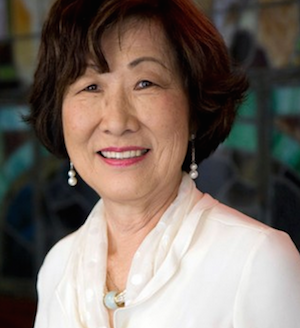Dear Sally,
I find this common among many families, so I’m going to address this to out-of-town siblings: Become a pillar of support. This means, do not give advice to or judge the primary caregiver. Their job is all consuming and they are doing the best they can. Unless you live with the person being cared for, you will not know what caregiving encompasses. Telephone conversations with loved ones reveal very little because of social graces. My mother had a standard conversation:
Okasan: “Hello . . .”
Caller: “Long time no see. How are you?”
Okasan: “Oh, I’m fine.”
This conversation did not give a clue as to where she was in the stages of the disease, nor the demands being made of the caregiver. Asking questions requiring very little memory tells us hardly anything about the state of their dementia. For example:
Caller: “Did you have breakfast?”
Loved one: “Yes.”
Caller: “How are you doing?”
Loved one: “Good.”
Caller: “What are you going to do today?”
Loved one: “Oh, not much.”
Do not judge so easily that the caregiver is exaggerating because the loved one sounds so normal on the telephone. To find out what’s really going on, spend a few weeks, or even months, with your loved one without the primary caregiver in the house. Find out for yourself by taking on the role of primary caregiver. Before visiting, please check to see what dates are best for your loved one and his or her caregiver. There are schedules and appointments and unless you are able to take care of these, your visit needs to be coordinated with the caregiver — not made at your convenience. We need to respect the world created by the caregiver and the loved one. If you are unable to become an active caregiver, there are many other ways you can help. Ask the caregiver about:
- Finances: Contribute your share of expenses.
- Household: Pay for someone to do house cleaning or to take care of the yard.
- Carpentry: Work to make the house safe and Alzheimer’s-friendly.
- Express and show gratitude: For example, give gift cards for restaurants, massages, manicures, etc.
- Join a support group to learn about the disease and the demands it places on the caregiver so that you will have a better understanding of the situation. Educate yourself about the disease and its symptoms so that you will be able to converse on the same wavelength.
This is now addressed to you, the caregiver: Be honest when you are offered help. Asking for help does not mean that you are not the perfect caregiver. We often feel that others will not be able to give care like we do because of the structure and schedule we have established. I often felt that it was too much of a bother to explain to someone else how to give care to my mother because she was so used to me. There are many ways of giving care, as long as no one is hurt or mistreated. When a sibling helps with caregiving, try to get out of the house; ideally, take a vacation when they’re visiting. Write out the schedule for your siblings to follow, as change will confuse the one being cared for. A list with the following information will help:
- Physician’s name, office phone number (cell, if available) and address;
- Names and phone numbers of people who may have to be called upon in the event of a crisis (plumber, electrician, medical personnel, neighbors, friends, etc.)
- Shower/bath time;
- Meal times;
- Outings; and
- Favorite foods, TV shows, music and activities.
Both primary and out-of-town caregivers: Not everyone is cut out to be a caregiver, so be honest if you feel that you cannot handle the demands of being a caregiver and give help in other ways.
Aloha,
Frances
Dear Frances,
My husband was just diagnosed with Alzheimer’s. I’m at a loss, and I’m scared. I know there is so much mis-information. Where do I begin to obtain good information? What kinds of meds? How do I make our house Alzheimer’s-friendly?
~Roberta
Hilo
Dear Roberta,
Whoa! One day at a time. One need at a time. We need to progress with his needs as the disease follow its course; otherwise, we will be overwhelmed and frozen with stress. To begin with, your husband’s neurologist is the best source for all of your medical questions. For information: Put together a list of your concerns and visit the Alzheimer’s Association office in your community. They can direct you to the right resources. If you cannot get through the neighbor island numbers listed below, call the Honolulu office for information.
Maui: (808) 242-8636
Hilo: (808) 981-2111
Kaua‘i: (808) 245-3200
O‘ahu: (808) 591-2771
The National Alzheimer’s Association contact number and website are: 1-800-272-3900, www.alz.org. Call them for help. Another good source is the Eldercare Locator, which you can reach by calling 1-800-677-1116, or visiting www.eldercare.gov. Eldercare Locator helps families find resources and services in their own community (home care, adult day care and nursing homes). Eldercare Locator is a public service of the U.S. Department of Health and Human Services’ Administration on Aging. If there are support groups in your area, consider joining one, for it is here that you will not feel alone. You will learn how others are resolving some of the same problems you are facing. When I joined a support group at the Alzheimer’s Association, there were caregivers with loved ones at all stages of the diseases. That gave me insight into what to expect on a general level. I say “general” because there are individual differences in how this disease affects each person. Caregivers are very creative and these support groups are filled with them. Most of the Alzheimer’s Association offices have a library. Here are some book titles that may be helpful:
- On Alzheimer’s disease: “The A to Z of Alzheimer’s Disease” by Carol Turkington and Deborah Mitchell;
- On caregiving: “The 36-Hour Day” by Nancy L. Mace and Peter V. Rabins; and my books, “Mosaic Moon” and “Breaking the Silence.”
- On Alzheimer’s and children: “Getting to Know Ruben Plotnick” by Roz Rosenbluth, and my book, “Wordsworth Dances the Waltz.”
On legal issues: “Long-term Care: How to Plan & Pay for It” by J.L. Matthews. The local libraries probably have these books on their shelves, too. Remember: Take a deep breath . . . one day at a time.
Aloha,
Frances
|

